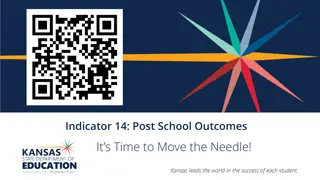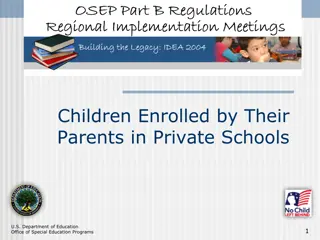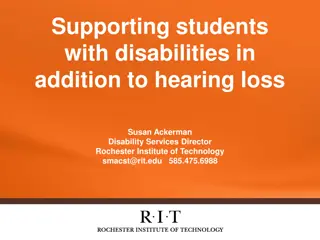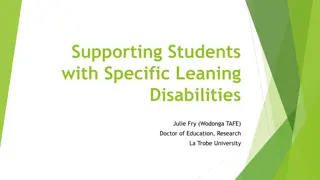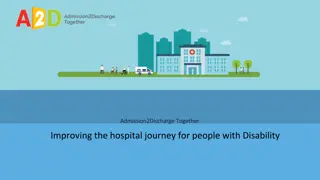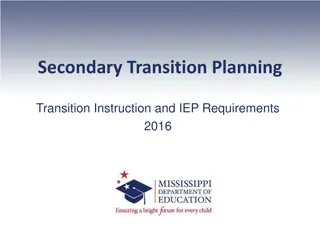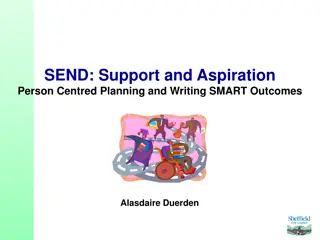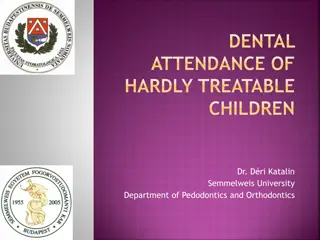Improving Educational Outcomes for Students with Disabilities
The Massachusetts Department of Elementary & Secondary Education focuses on Results-Driven Accountability to enhance the educational outcomes of children and youth with disabilities. Reflecting on past outcomes, the state aims to shift towards a balanced system that prioritizes measurable results and aligns accountability components for continuous improvement. Special education determinations in MA are based on compliance and student performance to provide targeted support and intervention where needed.
Download Presentation

Please find below an Image/Link to download the presentation.
The content on the website is provided AS IS for your information and personal use only. It may not be sold, licensed, or shared on other websites without obtaining consent from the author.If you encounter any issues during the download, it is possible that the publisher has removed the file from their server.
You are allowed to download the files provided on this website for personal or commercial use, subject to the condition that they are used lawfully. All files are the property of their respective owners.
The content on the website is provided AS IS for your information and personal use only. It may not be sold, licensed, or shared on other websites without obtaining consent from the author.
E N D
Presentation Transcript
Introduction to Making Money Matter (M3) and Results Driven Accountability Massachusetts Department of Elementary & Secondary Education
IDEA State Monitoring and General Supervision Core Concepts Improving educational results and functional outcomes for all students with disabilities Ensuring that LEAs are meeting IDEA s procedural requirements Monitoring LEAs Quantifiable indicators in priority areas - compliance indicators and monitoring Qualitative indicators to measure performance 2 Massachusetts Department of Elementary & Secondary Education
Reflecting on Outcomes In 2012, the U.S. Department of Education acknowledged that the educational outcomes for children and youth with disabilities have not improved as much as expected, even with intensive Federal regulatory oversight and significant funding provided to address closing achievement gaps through programs such as No Child Left Behind and IDEA. 3 Massachusetts Department of Elementary & Secondary Education
Shifting the Balance to Results Driven Accountability Vision Aligning components of accountability to support States and LEAs to improve results for infants, toddlers, children, and youth with disabilities, and their families. Prioritizing improvement of outcomes Movement from a one-size-fits-all, compliance- focused approach to general supervision to a more balanced system that looks at results and outcomes. 4 Massachusetts Department of Elementary & Secondary Education
Results Driven Accountability in MA MA is an outcome-oriented state The system for making special education determinations is aligned with the State s accountability system Outcome data inform state special education determinations and policy Improving positive outcomes for students with disabilities is critical 5 Massachusetts Department of Elementary & Secondary Education
MA Special Education Determinations States must assign special education determination levels based on compliance and student performance Meets Requirements Provisional (MRP) Meets Requirements (MR) Meets Requirements At Risk (MRAR) Needs Assistance (NA) Needs Intervention (NI) Needs Substantial Intervention (NSI) Federal IDEA regulations allow states to direct use of funds for districts identified as NA, NI, or NSI 6 Massachusetts Department of Elementary & Secondary Education
M Purpose NA, NI, NSI Districts redirect at least 2% of the 240 Grant allocation target use of funds to improve educational results and functional outcomes for students with disabilities 7 Massachusetts Department of Elementary & Secondary Education
Vision for M3 work General and Special Education work together to blend and braid knowledge and resources More than Professional Development Reorganize systems for results and efficiency Innovative & difficult work break down silos You have already started the work leverage what you are already doing Think outside of the box 8 Massachusetts Department of Elementary & Secondary Education
The M3 Framework District: DESE: Multi-year collaborative systems improvement process: Conduct self-assessment & root cause analysis Identify evidence based practices and needed system improvements Create multi-year plan and a 1-year action plan Use new Planning for Success process and tools Framework for collaborative systems improvement Support assessment of strength and needs Facilitate access to resources Deliver individualized assistance through the Statewide System of Support (SSoS) 9 Massachusetts Department of Elementary & Secondary Education
M Project Process (Repeating) Create Blend (Re) Assess Implement Plan Monitor Progress Assess Results Aligned Resources Needs Plan 10 Massachusetts Department of Elementary & Secondary Education
Starting Connect with your district s Improvement Leadership Team Contact SSoS Liaison Align with improvement planning for all students within your local context Choose a complementary planning process Massachusetts Department of Elementary & Secondary Education
Self Assessment Identify areas that will make the biggest impact for students with IEPs Target areas data suggests is concerning Data source examples SPP/APR Indicators DESE Profiles Edwin DART RADAR Local Student Information System Stakeholder input Examine root causes Consider infrastructure analysis Massachusetts Department of Elementary & Secondary Education
Improve K Readiness Improve Disciplinary Practices and Reduce Removals Promote Inclusive Education Root cause analysis & evidence- based practice examples Support Appropriate Identification and Eligibility Improve Literacy Development Improve Performance on Statewide Assessments Improve Engagement in School 13 Massachusetts Department of Elementary & Secondary Education
Self-Assessment Resources Assessment Literacy Self- Assessment and Gap Analysis Tool Behavioral Health in Public Schools Conditions for School Effectiveness Coordinated Program Review Criteria District Data Tool Kit Disciplinary Removals Inventory District Curriculum Mapping District self-assessment tool ESE Educator Evaluation Self- Assessment Form Expanded Learning Time Equity, Inclusion, and Opportunity ILP Implementation Inclusive Practice Tool: Superintendent Self-Assessment Learning walks Professional Development Self- Assessment Promoting Student Self- Determination High Quality Kindergarten Technology Self-Assessment Tool MTSS Self-assessment tool Turnaround Practices Organizational Assessment and Reflection Tool Massachusetts Department of Elementary & Secondary Education
District Considerations What evidence-based practices make the most sense within your district context? What systems improvement are needed? Create new special education systems and practices Redesign for collaborative general and special education systems and supports Enhance current systems and goals How can this work complement improvement goals and current district priorities? Massachusetts Department of Elementary & Secondary Education
Fund Use Examples Consultation Facilitator to guide the strategic planning process Student outcomes analysis Program Review Fiscal analysis strategic use of funds Climate and culture analysis Targeted assistance External/community partnerships High Quality Professional Development (HQPD) and individual coursework Stipends Massachusetts Department of Elementary & Secondary Education
Planning Create a Multi-year Improvement Plan AND Create an Annual Action Plan for the district and participating schools Plans should be: Inclusive Flexible Simple Accessible 17 Massachusetts Department of Elementary & Secondary Education
Steps in Creating the Plan Envision the future Analyze district performance, educator evaluation, and community feedback data for trends and patterns Backward-design the improvement strategy from specific, desired student outcomes, researching effective practices 18 Massachusetts Department of Elementary & Secondary Education
Resources for Creating the Plan Planning team Envisioning the future Analyzing data for root causes Analyzing district planning practices & culture (SWOT analysis) Identifying strategic objectives & initiatives Reviewing the district draft plan for quality Using the DESE Planning for Success (PfS) template, rubric, & model Involving the SSoS Regional Liaison 19 Massachusetts Department of Elementary & Secondary Education
Steps for M Plan Alignment Connect to district improvement/turnaround/action strategies, plans, & goals Connect to school improvement/turnaround strategies & plans Connect to educator development strategies & goals Leverage budget, grants, and resources in support of the plan Build community commitment to the plan 20 Massachusetts Department of Elementary & Secondary Education
Resources for System Alignment M3 Project District Improvement or Turnaround Plan School Improvement Plan or Charter School Action Plan Educator Development & Evaluation Systems School Day & Year Scheduling Systems District and School Budgets District/School & DESE Data Systems General Education & Special Education Systems Instructional Support Team, Instructional Leadership Team, & Parent Groups with M Planning Team SSoS Regional Liasion 21 Massachusetts Department of Elementary & Secondary Education
Steps to Multi-Year Plan Implementation Create an annual action plan with progress & impact benchmarks Create an internal communication plan Monitor & report on progress Make mid-course changes as needed Re-assess & re-design the plan as needed 22 Massachusetts Department of Elementary & Secondary Education
Deeper Planning Defining the task Focusing on its importance Laying out a timeline and responsibilities Selecting protocols Notes for facilitators Developing agendas and slide content Using results to keep moving forward Communicating the plan to others 23 Massachusetts Department of Elementary & Secondary Education
Examples of Protocols Visioning Back to the Future Root causes 5 Whys Planning practices SWOT Analysis Implementation benchmarks Resources needed (who/what/when) Action planning 24 Massachusetts Department of Elementary & Secondary Education
Resources for Plan Implementation Tools for creating action plans Including implementation and early evidence of change benchmarks Monitoring and reporting on action plan progress Setting meaningful outcome measures Guiding questions Suggested measures Comparative outcome data SSoS Regional Liaison 25 Massachusetts Department of Elementary & Secondary Education



